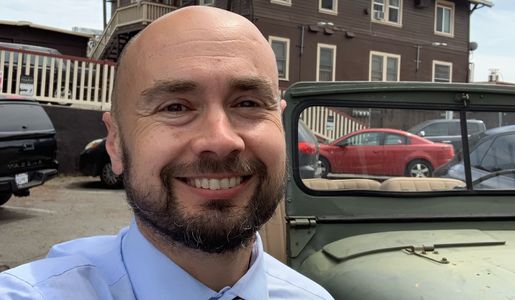Alumni Spotlight: Working for the LA City Attorney
As a student in the joint IRJD program at the Frederick S. Pardee School of Global Studies at Boston University, Andrew Said (Pardee ’01, Law ’01) knew that he wanted to become a lawyer after graduating, but was seeking something more than the conventional law firm track.
After gaining experience in the public sector as well as the criminal justice system through an externship with the U.S. Attorney’s Office in Boston during his final year at Boston University, Said went to work as the Legal Services Manager for the LA Free Clinic where he supervised a staff of volunteer attorneys providing legal help in immigration law, bankruptcy, family law and consumer law.
“In 2002, I had the opportunity to join the Office of the Los Angeles City Attorney,” Said said. “I have been there ever since. I spent 14 years as a trial attorney prosecuting violent crimes, DUIs, hit-and-runs, thefts, frauds, and sex crimes before making my way to my current assignment as a Neighborhood Prosecutor.”
As a Neighborhood Prosecutor with the LA City Attorney, Said is assigned to the Los Angeles Police Department’s Olympic Division in Koreatown where he works as a local problem solver who combats destructive community crimes such as drug sales, prostitution, illegal dumping, graffiti and more. By helping to address such criminal activity before it turns into more serious offenses, Said works to make Los Angeles safer by improving the quality of life for residents every day.
“The essential difference between a Neighborhood Prosecutor and a conventional prosecutor is the comprehensive nature of our approach. Rather than waiting for cases to come to us from law-enforcement partners, we are actively involved in pro-active crime-fighting strategies,” Said said. “A large part of our work involves crime prevention. When we recognized recurrent crime patterns in communities, we look to address problem properties and community engagement to break the cycle. These interventions can range from environmental design to youth programs. I am also involved in active transportation and protecting pedestrians and cyclists.”
Said says his role allows him to be a large part of the community he serves because Neighborhood Prosecutors work from each of the 21 LAPD stations across the city which allows him more direct interaction with residents. He is plugged in to the unique challenges and frustrations faced by residents and is accessible, responsive and ready to assist.
Because Los Angeles is a true global city, Said says his Pardee School education has provided him with the background knowledge to understand how all the moving parts of our world fit together. Early on as a Neighborhood Prosecutor, Said was assigned to Los Angeles’ Westlake District which is home to the largest concentration of Central American refugees in the United States.
“Many of the new arrivals are unaccompanied minors fleeing violence and poverty in Guatemala and elsewhere. Some only speak K’iche’ and other Mayan dialects,” Said said. “My background in International Relations helped me to understand where these kids are coming from and how they may easily be preyed upon by gangs and others looking to exploit them on arrival to the States.”
As a student, Said says he always enjoyed the more practical courses offered by the Pardee School — including one on Strategic Intelligence taught by Associate Professor Emeritus of International Relations Arthur Hulnick.
“We worked on group projects grappling with predicting future events in turbulent parts of the world. My group worked on an assessment of whether the Taliban would hand over Osama Bin Laden to stand trial in the US for the embassy bombings in Kenya and Tanzania in 1998. This was long before Al Qaeda and Bin Laden were household names,” Said said. “While perhaps the topic was quite far removed from anything I have actually worked on in my career, the principles are not. The course taught me to work with others on projects that were forward looking and make predictions based on careful investigation and assessment of information.”
Said also highlighted the process of writing a policy paper with his faculty adviser, Professor Emeritus of International Relations General (ret.) Frederick Woerner, as a formative experience that still informs how approaches his work as an attorney.
“Again in the policy paper, I had to grapple with a real problem and come up with a solution. My topic was resolving the civil war in Colombia. This was an incredibly complex situation that had persisted for over forty years, with numerous conflicting interests involved,” Said explained. “The trick was to come up with a compromise that would endure without just leading to another round of conflict. In whatever profession you choose, you will be confronted with difficult decisions and I appreciated learning this decision-making framework.”
Said urged current Pardee School students to follow their academic interests and take chances trying new things while they have the opportunity to do so as a student. He also highlighted the importance for students to volunteer for organizations that they support (and might be interested in working for someday).
“Don’t be shy and get your foot in the door! There is no way to know how you will like something until you try. It is best to experiment as a student while you have the freedom to try new things,” Said said. “Look out for volunteer opportunities. Frequently these volunteer positions lead to paid work. Think about it – if you were on the hiring committee, what else demonstrates a sincere desire to work somewhere more than someone who is willing to do the job for free?”
